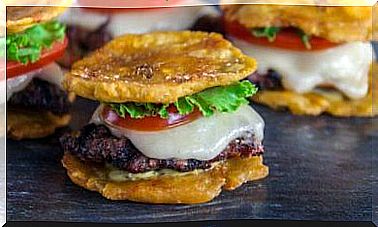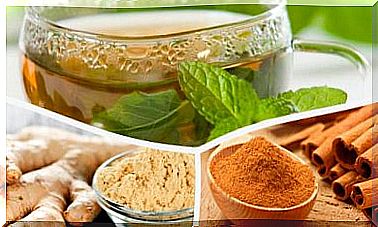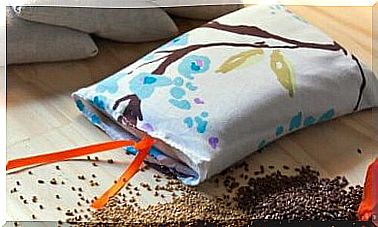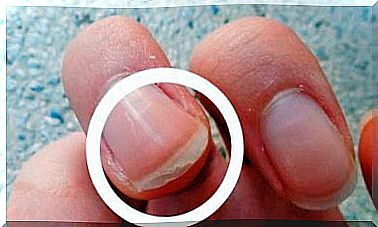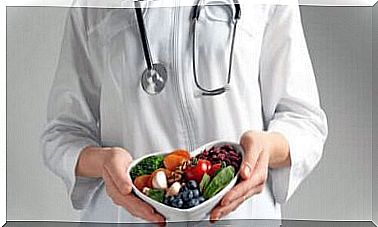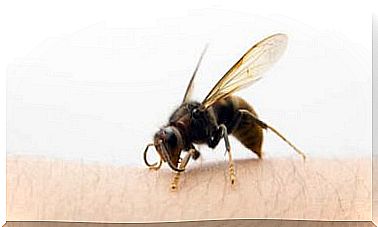Gastroesophageal Reflux Disease: How To Calm Your Symptoms By Dietary Changes?
Gastroesophageal reflux disease manifests itself as acidity and regurgitation. If you are suffering from these symptoms, it is probably advisable to change your diet and general habits.

The diet for gastroesophageal reflux disease is not the same as that of any other balanced diet. To alleviate the symptoms of this disease, it is necessary to avoid certain foods that exacerbate it.
In this article, we will tell you what changes you can make to feel better and avoid the main inconveniences caused by gastroesophageal reflux disease.
What is gastroesophageal reflux disease?
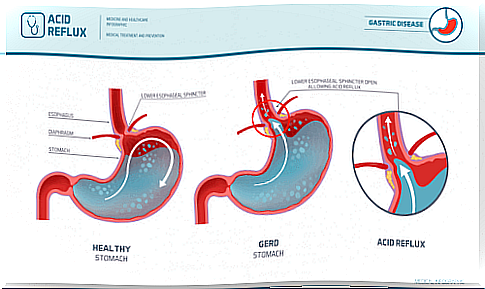
Gastroesophageal reflux disease occurs when the muscle at the end of the esophagus – the tube that carries food from the mouth to the stomach – does not close properly. This is why stomach acids can move up into the esophagus, irritating it.
If you are suffering from this condition, you may experience heartburn. Symptoms of gastroesophageal reflux are also symptoms of gastric fluid feeling in the back of your mouth (regurgitation), a dry cough, or difficulty swallowing.
To alleviate these unpleasant symptoms, you can:
- Eat small portions during meals
- Avoid very spicy, fatty or acidic foods
- Adopting a diet for gastroesophageal reflux disease
- Do not drink alcohol
- Lose weight if you are overweight
The gastroesophageal reflux diet
To improve the symptoms generated by this disease, it is not only necessary to eat a healthy and balanced diet, but also to avoid irritating foods. Here are a few tips.
1. Eat a balanced diet
Your doctor will advise you to adjust your eating habits so that you are eating the right amount of vegetables and fruit, as well as grains and legumes each day.
Vegetables provide vitamins and minerals while being low in fat and sugar. Asparagus, cauliflower, broccoli, potatoes, and cucumbers are good options for reducing acidity.
Among the fruits, we advise you to avoid citrus fruits which can generate acidity, as well as tomatoes. Better to eat bananas, apples, pears and melons.
Among cereals, oats stand out. Choose whole grain varieties and without adding sugar, not only will you get fiber for your body, but you will see how it helps reduce stomach acidity. You can also choose brown rice and bread.
2. Avoid coffee to fight gastroesophageal reflux disease
Coffee is one of the foods that you should eliminate from your diet for gastroesophageal reflux disease because it is irritating and can increase stomach acidity. We suggest that you drink herbal teas instead: thyme, orange, hops or chamomile.
3. Eat 5 meals a day
By eating five meals a day, you will eat less. This way, you will avoid overloading your stomach and minimize the risk of food backing up your esophagus.
4. Do not eat hot foods
Spices such as paprika, chili, vinegar, cayenne pepper, and curry irritate the lining of the stomach, exacerbating the acidity.
5. Increase the consumption of omega-3 and omega-6
Omega-3 and omega-6 fatty acids have anti-inflammatory qualities that can help reduce inflammation in the lining of the stomach. Take the opportunity to eat fish and seafood, always avoiding frying and opting for healthy cuisine.
6. Do not eat fried food to fight against gastroesophageal reflux
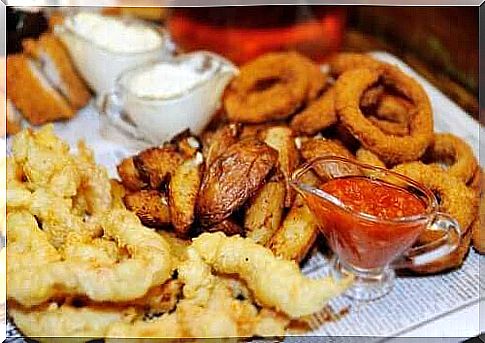
Fried and fatty foods should be removed from the diet in case of gastroesophageal reflux disease. Fatty foods make digestion difficult, forcing the stomach to work harder and produce more acid. Choose another type of cooking: steam, water, oven, microwave or in foil.
7. Consume little liquid during meals
Drink fluids during the day but not with meals (or drink little). Thus, you will avoid filling your stomach to the maximum and overloading it. Remember that water should be the drink of choice, as opposed to sodas and juices which are also considered irritants.
8. Choose skimmed dairy products
As we have said before, fat makes digestion difficult and can exacerbate symptoms of reflux. It is therefore better to consume yoghurts, milk and skimmed cheeses. Their digestion will be less laborious for your body.
9. Avoid exercising after a meal
Sport after a meal can promote the onset of gastroesophageal reflux disease. If you exercise, try to do it within two hours of your meal.
10. Eat at least two hours before going to bed
Lying down can exacerbate symptoms of gastroesophageal reflux disease. Eat early dinner to allow your body to digest before going to bed. You can also sleep with tall pillows that allow you to hold your head higher than your body to reduce discomfort.
11. No smoking
Tobacco is not a food, but it can also act as an irritant. If you have symptoms of gastroesophageal reflux disease and you smoke, we recommend that you quit smoking for your health and comfort.
12. Consume healthy fats
Olive, sesame or sunflower oil, avocados, walnuts and flax seeds provide healthy fats for the body. Eat these foods in salads, toast, and all kinds of dishes.
13. Say goodbye to chocolate and chewing gum
One of the ingredients in chocolate is methylxanthine, a component that helps relax smooth muscles and increases the possibility of reflux. Chewing gum, as well as peppermint candies, can generate acidity.
14. Consume ginger for gastroesophageal reflux disease
Ginger has anti-inflammatory properties that can help relieve the discomfort caused by gastroesophageal reflux disease. You can consume it as a condiment for your meals or prepare a ginger infusion.
Consult your doctor to find out the best diet for gastroesophageal reflux disease based on your nutritional and calorie needs. He or she will guide you through the process of alleviating your symptoms.
